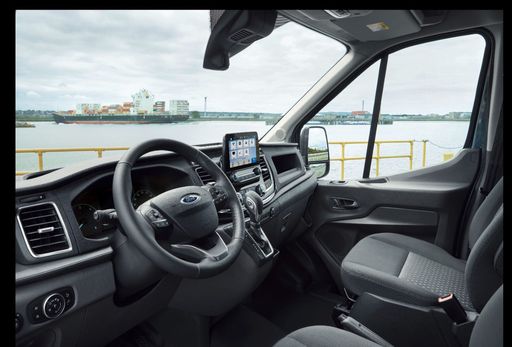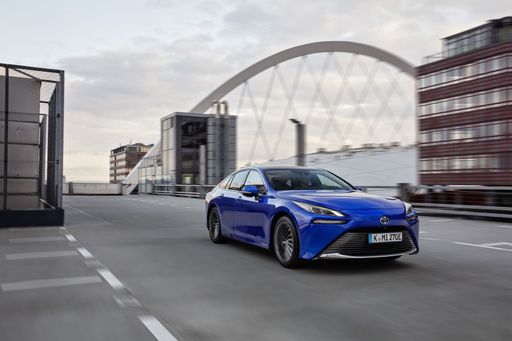Ford Transit Connect VS Toyota Mirai
Ford Transit Connect
The Ford Transit Connect is a versatile compact van that seamlessly combines functionality with a comfortable driving experience. Its spacious interior is designed to accommodate both passengers and cargo, making it an ideal choice for small businesses and active families alike. With its efficient engine and agile handling, the Transit Connect offers a reliable and economical option for urban and suburban driving.
detailsToyota Mirai
The Toyota Mirai represents a groundbreaking step in hydrogen fuel cell technology, offering an eco-friendly alternative to traditional petrol engines. Its sleek design and futuristic aesthetic make it a standout on the road, while the interior combines comfort with cutting-edge features. With its impressive range and quick refuelling capabilities, the Mirai is paving the way for the future of sustainable motoring.
details @ media.ford.com
@ media.ford.com
 @ media.ford.com
@ media.ford.com
 @ media.ford.com
@ media.ford.com
 @ Toyota
@ Toyota

|

|
|
|
|
Costs and Consumption |
|
|---|---|
|
Price
about 26200 - 41500
£
|
Price
-
|
|
Consumption L/100km
-
|
Consumption L/100km
-
|
|
Consumption kWh/100km
-
|
Consumption kWh/100km
-
|
|
Electric Range
-
|
Electric Range
-
|
|
Battery Capacity
19.7
kWh
|
Battery Capacity
-
|
|
co2
-
|
co2
-
|
|
Fuel tank capacity
50
L
|
Fuel tank capacity
-
|
Dimensions and Body |
|
|
Body Type
Cargo Van
|
Body Type
-
|
|
Seats
2 - 5
|
Seats
-
|
|
Doors
4
|
Doors
-
|
|
Curb weight
-
|
Curb weight
-
|
|
Trunk capacity
-
|
Trunk capacity
-
|
|
Length
4500 - 4868
mm
|
Length
-
|
|
Width
1855
mm
|
Width
-
|
|
Height
1856 - 1860
mm
|
Height
-
|
|
Payload
-
|
Payload
-
|
Engine and Performance |
|
|
Engine Type
Diesel, Plugin Hybrid
|
Engine Type
-
|
|
Transmission
Manuel, Automatic
|
Transmission
-
|
|
Transmission Detail
Manual Gearbox, Automat. Schaltgetriebe (Doppelkupplung)
|
Transmission Detail
-
|
|
Drive Type
Front-Wheel Drive
|
Drive Type
-
|
|
Power HP
102 - 150
HP
|
Power HP
-
|
|
Acceleration 0-100km/h
11.4 - 13.5
s
|
Acceleration 0-100km/h
-
|
|
Max Speed
175 - 186
km/h
|
Max Speed
-
|
|
Torque
280 - 350
Nm
|
Torque
-
|
|
Number of Cylinders
4
|
Number of Cylinders
-
|
|
Power kW
75 - 110
kW
|
Power kW
-
|
|
Engine capacity
1498 - 1968
cm3
|
Engine capacity
-
|
|
Top speed
175 - 186
km/h
|
Top speed
-
|
General |
|
|
Model Year
2024
|
Model Year
-
|
|
CO2 Efficiency Class
-
|
CO2 Efficiency Class
-
|
|
Brand
Ford
|
Brand
-
|
Ford Transit Connect
The Versatile Ford Transit Connect: An In-Depth Overview
The Ford Transit Connect has long been a staple in the light commercial vehicle market. Renowned for its versatility, efficiency, and robust build, this model offers a variety of configurations to suit different business needs. In this article, we delve into the technical specifications and innovative features of the latest iteration of this ever-popular vehicle.
Powerful Engine Options and Performance
Under the bonnet, the Ford Transit Connect offers a range of powerful and efficient engines. The standard diesel options include the robust 2.0 EcoBlue Diesel engines, available with either manual or automatic transmissions. For those seeking a greener option, the Transit Connect also offers a 1.5 EcoBoost PHEV Plug-In Hybrid with a 150 PS output. This array of options ensures that drivers can choose a powertrain that best suits their performance requirements and environmental considerations.
Advanced Design and Dimensions
In terms of design, the Transit Connect is engineered for practicality without sacrificing aesthetics. Measuring between 4500 mm and 4868 mm in length, and 1855 mm in width, it is well-suited for urban environments while offering ample cargo space. The vehicle’s height spans from 1856 mm to 1860 mm, providing a spacious interior that is both comfortable and functional for drivers and passengers alike.
State-of-the-Art Features and Specifications
Technology and convenience feature prominently in the Transit Connect’s offerings. The latest model includes refined details and equipment lines like Limited, Trend, and the more feature-rich Active Automatik. Its advanced infotainment system, safety features, and driver assistance technologies work harmoniously to enhance both driving experience and passenger safety.
Additionally, the vehicle boasts a battery capacity of 19.7 kWh in the hybrid variant, enabling impressive electric-only ranges for day-to-day journeys. The inclusion of dual-clutch automatic transmission in certain models significantly enhances driving dynamism and reduces fuel consumption.
Fuel Economy and Driving Range
The Transit Connect impresses with its fuel economy, particularly in its hybrid iteration. With a fuel tank size of 50 litres and the efficiency of hybrid technology, the vehicle assures drivers of fewer stops at filling stations and more time spent on the road. Despite its commercial nature, it manages to achieve competitive emission figures, an important factor for eco-conscious businesses.
Versatility in Configuration
One of the standout features of the Ford Transit Connect is its adaptability. Available in different configurations, this model can accommodate between two and five passengers, making it suitable for both cargo transport and passenger services. Its flexibility extends to the range of available options for customisation, ensuring it can be configured for various business and personal needs.
Conclusion
The Ford Transit Connect continues to lead the market with its blend of robust performance, innovative features, and adaptability. Whether used for urban delivery, passenger transport, or any number of other commercial applications, the Transit Connect fulfills its role effectively, embodying Ford’s commitment to quality and performance.
With its combination of traditional internal combustion and hybrid powertrains, the Transit Connect addresses both modern environmental concerns and longstanding demand for reliable utility workhorses, making it a noteworthy option for businesses and families alike.
Toyota Mirai
The Future of Driving: Introducing the Toyota Mirai
The Toyota Mirai represents a significant leap forward in automotive innovation, being one of the leading vehicles in the hydrogen fuel cell market. As we continue to search for sustainable transportation solutions, the Mirai stands out with its pioneering technology and exceptional driving features.
Revolutionary Hydrogen Fuel Cell Technology
At the heart of the Toyota Mirai is its groundbreaking hydrogen fuel cell system. Unlike conventional internal combustion engines, the Mirai uses a fuel cell stack to generate electricity through the chemical reaction between hydrogen and oxygen. This process not only powers the car with zero emissions—producing only water vapour as a byproduct—but also delivers a smooth and silent drive.
Technical Specifications and Performance
The Toyota Mirai is designed with performance in mind. It boasts a power output of 182 PS (134 kW) and delivers a robust 300 Nm of torque, allowing it to accelerate from 0 to 100 km/h in just 9.2 seconds. While its top speed is a respectable 175 km/h, it's the Mirai's impressive range that really stands out. The vehicle can travel up to 650 km on a single hydrogen fill-up, making it a practical choice for long-distance travel.
Sophisticated Design and Comfort
Designed as a saloon, the Toyota Mirai combines aesthetic appeal with comfort. Its dimensions—4975 mm in length, 1885 mm in width, and 1470 mm in height—provide a spacious interior for five passengers. The design is sleek and modern, reflecting its advanced engineering. The boot offers 300 litres of storage, suitable for everyday needs.
Advanced Features and Safety
The Toyota Mirai doesn't just excel in propulsion technology; it also includes a range of advanced features to enhance driver comfort and safety. Available in three trims—Advanced, Executive, and Luxury—the Mirai includes state-of-the-art safety systems and infotainment options to ensure a connected and secure driving experience.
Cost and Efficiency
While the price of the Toyota Mirai ranges from €65,990 to €76,290, its monthly running costs—estimated between €1,496 and €1,672—and per kilometre costs of 59.9 to 66.9 cents, reflect the efficient nature of hydrogen-powered vehicles. Considering its innovative technology, the Toyota Mirai offers excellent value for those looking to invest in the future of eco-friendly transport.
The Toyota Mirai: Driving Towards a Sustainable Future
Overall, the Toyota Mirai is more than just a car; it's a vision for the future of sustainable transportation. With its cutting-edge hydrogen fuel cell technology, impressive range, and commitment to zero-emissions driving, the Mirai sets a new standard in environmentally conscious car design. Whether you're an eco-enthusiast or just someone seeking a reliable and technological advanced vehicle, the Toyota Mirai is worth considering.
